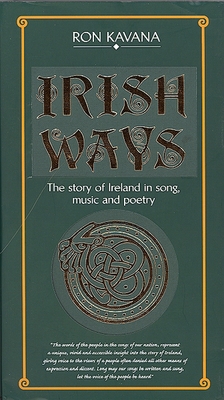Ron Kavana's Irish Ways
David Granville reviews Irish Ways: the story of Ireland in song, music and poetry by Ron Kavana (4 CD and book box set), Proper Records PRDP400, £29.99

CORK-BORN singer-songwriter and multi-instrumentalist Ron Kavana has really pushed the boat out this time around.
Six years in the making and accompanied by his regular Alias Band and a bevy of top-drawer guest musicians, including Brian McNeill, Gino Lupari, Shane Mac Gowan, Terry Woods, Paddy Keenan and Niamh Parsons, the end product is a remarkable 4-CD box set and book telling the story of Ireland through songs, music and poetry.
The four disks, which comprise five hours of music and narration, are accompanied by a beautifully illustrated 122-page book providing a overview of Irish history from the earliest times to the present day and the historical context and provenance of the material performed and narrated.
Divided chronologically they cover: Pre-historic Ireland to Normans, Henry VIII to William of Orange (CD1); Penal Laws to Age of Revolution, Rights of Man & 1798 (CD2); Act of Union to Great Hunger, Emigration & The Diaspora (CD3); Fenians to Civil War, Free State to Modern Ireland (CD4).
Kavana has approached his subject from a staunchly anti-colonial, nationalist perspective - you won't find any 'counterbalancing' songs from Orange or unionist traditions here.
Writing in his introduction to the accompanying book, Kavana explains his choice of material:
"Many of the songs on these albums are songs of a bygone era: taught in schools in a less sensitive age, or popularised by ballad groups in the Folk Revival of the '50s and '60s but now out of favour with more commercially-minded, traditionally purist, and/or 'politically correct' artists of today. Some are curiosities of their time, others are universal and timeless masterpieces. Whatever one's view of their merits/faults, they are songs which supported and helped shape an ideology which we need to understand if we are to come to terms with our own attitudes and biases."

His objective clearly stretches beyond pure 'musical history'. This is perhaps most obvious towards the end of the final CD, when Kavana delivers a searing, critique of modern Ireland.
Reminding listeners that pledges to introduce social equality from the era of the democratic programme and the First Dail remain unfulfilled, he goes on to castigate the social conservatism of post-Treaty Ireland. (the 'treaty' referred to is the one which ended the war of independence, effectively copper-fastened partition and established the Irish Free State.)
However, he reserves his his most potent venom for the culture of individualism, corruption, greed and inequality which has developed in Ireland in the modern era of the 'rip-off Republic' and the boom years of the so-called 'Celtic Tiger'.
It is a powerful but bleak analysis to which Kavana, by his own admission "offers little by way of counterbalance".
Those already familiar with Ron Kavana's output will be aware that he's won more folk music awards than you can shake a shelleighly at and has written and recorded many fine original songs - many of which have been covered by artists of the calibre of Dick Gaughan, Waterson: Carthy, Eileen Ivers and Cherish The Ladies.
His musical and song writing talents talents have also led him to collaborate with a diverse range of musicians ranging from The Pogues, Elvis Costello, and Paddy Moloney through to Jack Bruce, Donovan, Alexis Korner, Clarence 'Frogman' Henry and even the Rolling Stones - though we won't hold the latter against him on this occasion.
For Kavana, who went back to university in 1995 and graduated with first-class honours in Irish studies and film studies and who now divides his time between research, writing, recording and film making, this mammoth project has clearly been a labour of love.
I have no doubt that it will be popular with tourists visiting Ireland this summer. It should also prove a hit with the Irish diaspora and Irish music lovers throughout the world, particularly those who like a decent dash anti-imperialism along with their folk music.
A few small quibbles: having played the full set several times now, it didn't take long for the historical narration which intersperses the excellent songs and musical performances to become mildly irritating. Personally, I imagine that it won't be long before I transfer the musical element to my MP3 player and listening to it that way.
On the historical side, Kavana's assessment of Daniel O'Connell is exceptionally rose-tinted. It is also disappointing to find that the only book listed about the Irish labour leader and revolutionary James Connolly is the mediocre effort of right-wing pro-imperialist historian Ruth Dudley Edwards. The late Desmond Greaves' biography of Connolly or the more recently published biography of Connolly by Donal Nevin 'James Connolly: a full life' would have been more appropriate choices.
But these are minor details and cannot mar Kavana's remarkable and audacious tour-de-force.
Connolly Association, c/o RMT, Unity House, 39 Chalton Street, London, NW1 1JD
Copyright © 2007 David Granville

